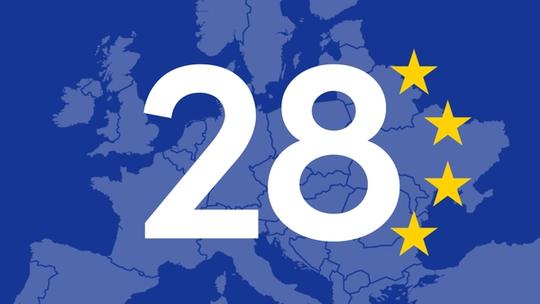What Is the EU’s 28th Regime – and Will It Help Startups Succeed?


A plan for a pan-European corporate code is in the works. Supporters say the legal framework – the so-called 28th Regime – would help firms scale across the bloc and better keep up with the U.S. and China.
- A push for a pan-European company code is gaining traction in a bid to keep startups from leaving the EU.
When campaigners started a petition last year, advocating for a pan-European corporate code, they expected a few hundred people to sign. Instead, it unleashed a tidal wave of support: The petition now stands at over 18,000 signatures, including backing from EQT. Brussels too is stepping up. In September, the European Commission concluded a public consultation on the subject.
“It's just resonated so quickly,” says Iwona Biernat, one of the petition’s organizers at lobby group EU-INC. “This is a once-in-a-lifetime opportunity.”
The central complaint is that the EU’s single market is single in name only. In reality, each member state mandates its own company law and registration rules, creating a bureaucratic labyrinth that can make expansion slow and expensive. The EU created just 14 companies from scratch with a public valuation of more than $10bn over the 50 years through 2024, according to data collected by Andrew McAfee, a researcher at the MIT Sloan School of Management. The U.S. produced 241 over the same period.
“It’s complicated to scale a company across all the different countries in Europe,” says Victor Englesson, EQT’s head of early-stage technology. “Incorporating from a legal perspective is a cumbersome process. And that has consequences. It affects how you structure incentive programs for employees and how you attract and retain talent.”
It’s more than just money on the line when founders flee to the U.S., Englesson says. “We’ve gone from a long period of globalization to a more unpredictable geopolitical environment… And it’s vital to ensure Europe is not dependent on [others for] these critical technologies.”
The 28th Regime
The EU’s proposed solution is to create a single European corporate framework that startups can choose to operate under. Hence, it’s been dubbed the “28th Regime,” serving as an extension to the existing 27 member states.
The basic idea is to introduce a unified set of rules on company formation, shareholder rights and director duties – with thornier issues like taxation and employment law still up for debate. It builds on the creation in the early 2000s of the “European Company,” which applied to public limited companies (PLCs) but not LLPs, the structure typically used by startups.
The proposal is now being spearheaded by the European Commission’s president, Ursula von der Leyen. National heads like French President Emmanuel Macron have shown support too, alongside backing from major groups including BusinessEurope and the European Investment Bank.
Europe’s problem isn’t a lack of talent. The region produces more STEM graduates than America. The EU even creates more companies, including more AI scale-ups. “We’re doing all the hard work – we’re educating, training and supporting people,” says Englesson. “We need to make sure we do whatever we can to make these people and companies stay in Europe.”
A silver bullet?
The EU Commission is expected to table a draft legislative proposal in early 2026. But turning it into law could be slow and politically fraught, because it touches areas currently controlled by nation states. Agreeing on the European Company rules took some 30 years of negotiations. Some parties want national laws to remain supreme, meaning a pan-European regime would merely be an additional layer. Others say this would complicate matters by making 27 different versions of an EU standard, on top of the existing 27 national laws.
EU-INC offers its own solution. It wants to “keep the scope narrow [and] focus on standardization,” says Biernat, by focusing first on having an EU register for companies to incorporate through, alongside an agreed corporate framework.
A standard EU structure would mirror the U.S., where most startups register as a Delaware C-Corp. While U.S. companies still have to deal with complexities when they cross state lines, at least “the corporate foundation is already standardized, so founders don’t waste months reinventing the wheel every time they expand,” Biernat explains.
But while the EU-INC movement wants Europe to be a unified economic entity, it has stayed clear of the wider political debate around tax or labor unification, fearing that these are too sensitive.
Indeed, there is resistance to a more extensive version of a 28th Regime from some labor unions. Among the critics is Oliver Roethig, who heads UNI Europa, a union with 7 million members.
UNI wants to ensure “that labor law [and] workers’ participation rights are not affected,” he says. If there were ever to be a standardized labor law, he stresses, there would also need to be a pan-European workers union and right to strike. Roethig fears that a European standard could serve as a loophole to evade worker protections and national regulations.
Small steps
The 28th Regime, at its core, is pushing for Europe to adopt a shared entrepreneurial ambition. While EU-INC’s proposal isn’t a “magic wand,” Biernat argues that it’s an important first step. Once a standard registry is in place, HR platforms like Remote or Oyster could then tackle country-by-country labor and tax complexities, she says.
Addressing Roethig’s concerns, Englesson offers a potential hybrid. “If you can combine the welfare state that we have in Europe with [U.S.] wealth creation, then you get the ideal outcome.”
For the time being, resistance from member states means that the commission may begin by introducing a European digital business identity, according to former European Central Bank President Mario Draghi, who led a 2024 report on EU competitiveness. It’s unclear what this digital identity might entail – and more ambitious proposals may have to wait.
Still, Biernat is hopeful. “If they could create the euro, they can do this.”
ThinQ by EQT: A publication where private markets meet open minds. Join the conversation – [email protected]
On the topic ofInsights
Exclusive News and Insights Every Week
Sign up to subscribe to the EQT newsletter.






